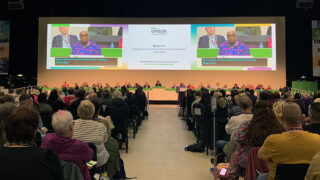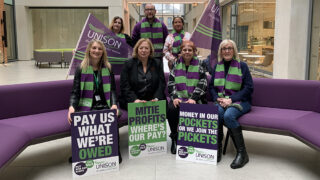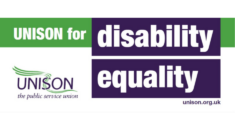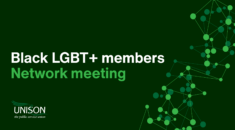The murder of George Floyd in the US and the disproportionate impact of COVID-19 on Black communities in the UK have focused attention on the everyday inequalities faced by Black people.
UNISON head of equality Gloria Mills provides some context on racism in the UK and explains how the union is at the forefront of the fight against it.
Gloria, do you feel that systemic racism has never meaningfully gone away?
Systemic racism is present in our institutions, both public and private. It has never meaningfully gone away, but it has taken different forms.
In the past, Black people experienced overt racism by being called names, seeing signs saying ‘No Blacks, No Irish, No Dogs’. You do not see such blatant signs any more, but systemic racism now takes place in our private institutions.
For example, in the banks when you go to pay a bill, some banks ask you to prove your identity. As the Windrush scandal showed, it is not sufficient for Black people just to be British – you’re asked to show different forms of identity just to withdraw your monthly salary.
It is the additional checks and hurdles faced in accessing everyday services, which for most white people will never be a problem.
So while we have moved away for the naked and overt racism that Black people faced before, racism is now practiced in more covert ways – with sophistry and subtlety, but it has the same negative outcomes.
Do you fear that Brexit – and now, maybe, the increased incidence of COVID-19 in the Black community – could propel the UK towards the frequent violence seen in the US?
We need to take action to ensure that this does not happen, but the UK tends to follow the same trajectory as the US.
However, we have a different culture in the UK of fairness and tolerance, and we have to ensure that those values win through. Our democracy in the UK is different in that we have a system of open justice and good judicial oversight – so having access to justice is important.
Accountability and transparency are also key cornerstones of our democratic tradition and we need to keep it this way.
Where the danger is looming is that we need to stop the dog whistle politics and policies that feed the toxic environment that could propel UK racists towards the frequent violence seen in the US.
What is UNISON’s role in this?
UNISON has an important and pivotal role. The union has always been in the vanguard – leading and shaping the agenda.
Leadership is critical in saying where the union stands on issues, and UNISON members have always been at the forefront of challenging the major social issues of our time.
So the union has to continue to be pro-active and visible in standing with all our members and communities.
As a public service union, we are in constant dialogue and engagement with our members who live in those communities and rely on those services.
UNISON has to use the size of its membership and the power of its access to influence change and continue to hold employers and the government to account.
We need to use the tools and power of collective bargaining to challenge discrimination, inequality and force employers to comply with their legal obligations.
How do we work to improve the lives of Black people in the UK?
We need to turn the dial on racism in our public and private institutions.
We need to challenge the low rate of employment for Black people from specific sectors of the labour market, education, manufacturing and construction. Unemployment remains high at almost three times the national rate.
On pay, research from the TUC found that the ethnicity pay gap is up to 25% and research by the Resolution Foundation reported that there was a £3.2bn pay penalty facing Black workers, with Black graduate men facing the biggest pay penalty of 17%.
In some sectors, young Black men in particular are excluded from apprenticeship opportunities. At every stage of the labour market, from recruitment, redeployment to redundancies, Black workers are ‘last in, first out’.
Black people are already over-represented in precarious, part-time, temporary and zero hours contracts.
We need to improve employment opportunities, challenge employment discrimination, implement positive action measures to redress employment and economic exclusion.
This continuum promotes economic inequality across generations of Black British people – and it seems that COVID-19 thrives on inequalities.
A recent Office for National Statistics report, comparing the COVID-19 deaths rates in England and Wales, finds that the mortality rate in the most deprived areas is twice as high as in the least deprived areas.
We need to break the cycle of discrimination, disadvantage and deprivation.
What do you think UNISON’s Black members are most concerned about and want to see changed?
Black members are most concerned that urgency and vigour are injected into the problems they face. They don’t want dither and delay while Black lives are lost.
So they are concerned about the lack of government action and the failure to improve and protect lives and livelihoods.
They expect to see the government taking the issue of the Public Health England (PHE) report seriously, giving it the attention and urgency it deserves instead of sidelining the findings on structural inequalities.
They are risking their lives to save others and they expect the government to act to save theirs.
Instead, what they have seen is more tokenistic lip service. They hoped to see government-wide ownership of this issue at a senior level.
They want to see the government bring into force sections of the Equality Act 2010 to address inequalities that result from differences in occupation, education, place of residence or social class; to implement the Conservative 2017 manifesto commitment to take action on the ethnicity and disability pay gaps and meet their commitments on gender pay reporting and equal pay.
They want a comprehensive race equality strategy and a full public inquiry into disproportionate deaths from COVID-19.
What do you think UNISON’s white members should do to support their colleagues?
White members are in a different place from Black members as they view racism through different optics.
White and Black members should have conversations not confrontations on their different perspectives.
We tend to be creatures of our environment. But we can change that by leaving our baggage behind in terms of our conditioning and stereotypes, and begin to have meaningful conversations.
White members do not always see the truth of Black people’s lived experience of everyday racism. It is important to listen and to learn.
Think about why it is that a Black person has a more difficult job to be heard than you do.
We can all make a difference if we stand together as trade unionists and don’t let employers divide and rule; challenge the micro-aggressions your colleagues and fellow trade unionists experience in the workplace.
My message is to step up, stand up and speak out in support of your colleagues – act in unison to help lift the barriers and burden of fighting everyday racism.








